一般将来时用法小结
一般将来时用法总结
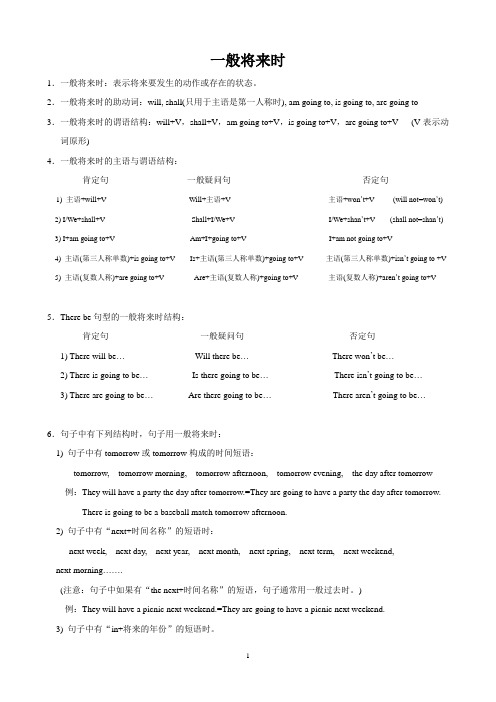
一般将来时1.一般将来时:表示将来要发生的动作或存在的状态。
2.一般将来时的助动词:will, shall(只用于主语是第一人称时), am going to, is going to, are going to3.一般将来时的谓语结构:will+V,shall+V,am going to+V,is going to+V,are going to+V (V表示动词原形)4.一般将来时的主语与谓语结构:肯定句一般疑问句否定句1) 主语+will+V Will+主语+V 主语+won’t+V (will not=won’t)2) I/We+shall+V Shall+I/We+V I/We+shan’t+V (shall not=shan’t)3) I+am going to+V Am+I+going to+V I+am not going to+V4) 主语(第三人称单数)+is going to+V Is+主语(第三人称单数)+going to+V 主语(第三人称单数)+isn’t going to +V5) 主语(复数人称)+are going to+V Are+主语(复数人称)+going to+V 主语(复数人称)+aren’t going to+V5.There be句型的一般将来时结构:肯定句一般疑问句否定句1) There will be…Will there be…There won’t be…2) There is going to be…Is there going to be…There isn’t going to be…3) There are going to be…Are there going to be…There aren’t going to be…6.句子中有下列结构时,句子用一般将来时:1) 句子中有tomorrow或tomorrow构成的时间短语:tomorrow, tomorrow morning, tomorrow afternoon, tomorrow evening, the day after tomorrow 例:They will have a party the day after tomorrow.=They are going to have a party the day after tomorrow.There is going to be a baseball match tomorrow afternoon.2) 句子中有“next+时间名称”的短语时:next week, next day, next year, next month, next spring, next term, next weekend,next morning…….(注意:句子中如果有“the next+时间名称”的短语,句子通常用一般过去时。
一般将来时的用法详解
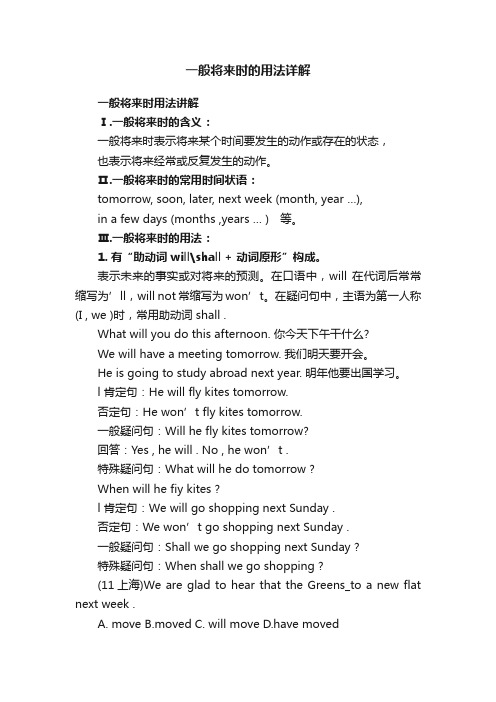
一般将来时的用法详解一般将来时用法讲解Ⅰ.一般将来时的含义:一般将来时表示将来某个时间要发生的动作或存在的状态,也表示将来经常或反复发生的动作。
Ⅱ.一般将来时的常用时间状语:tomorrow, soon, later, next week (month, year …),in a few days (months ,years … )等。
Ⅲ.一般将来时的用法:1. 有“助动词 will\shall + 动词原形”构成。
表示未来的事实或对将来的预测。
在口语中,will 在代词后常常缩写为’ll,will not 常缩写为won’t。
在疑问句中,主语为第一人称(I , we )时,常用助动词 shall .What will you do this afternoon. 你今天下午干什么?We will have a meeting tomorrow. 我们明天要开会。
He is going to study abroad next year. 明年他要出国学习。
l 肯定句:He will fly kites tomorrow.否定句:He won’t fly kites tomorrow.一般疑问句:Will he fly kites tomorrow?回答:Yes , he will . No , he won’t .特殊疑问句:What will he do tomorrow ?When will he fiy kites ?l 肯定句:We will go shopping next Sunday .否定句:We won’t go shopping next Sunday .一般疑问句:Shall we go shopping next Sunday ?特殊疑问句:When shall we go shopping ?(11上海)We are glad to hear that the Greens_to a new flat next week .A. moveB.movedC. will moveD.have moved( ) Who _____ we ____ swimming with tomorrow afternoon?A. will; goB. do; goC. will; goingD. shall; go2. 由“be going to + 动词原形”构成。
初中英语知识点归纳一般将来时的用法
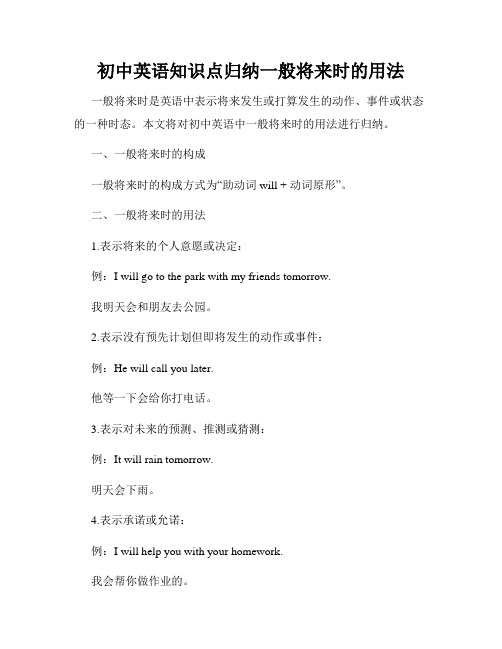
初中英语知识点归纳一般将来时的用法一般将来时是英语中表示将来发生或打算发生的动作、事件或状态的一种时态。
本文将对初中英语中一般将来时的用法进行归纳。
一、一般将来时的构成一般将来时的构成方式为“助动词 will + 动词原形”。
二、一般将来时的用法1.表示将来的个人意愿或决定:例:I will go to the park with my friends tomorrow.我明天会和朋友去公园。
2.表示没有预先计划但即将发生的动作或事件:例:He will call you later.他等一下会给你打电话。
3.表示对未来的预测、推测或猜测:例:It will rain tomorrow.明天会下雨。
4.表示承诺或允诺:例:I will help you with your homework.我会帮你做作业的。
5.表示对现在情况的预测或推测:例:She will be here soon.她马上就会到这里。
6.表示征求意见或征询意见:例:Will you come to the party tomorrow?明天你会来参加派对吗?7.表示习惯性或经常性的动作:例:He will often go swimming on weekends.他经常在周末去游泳。
三、一般将来时的否定与疑问句1.否定句构成:在will后面加not。
例:He will not come to the meeting tomorrow.他明天不会来开会。
2.疑问句构成:将助动词will提到句子的主语前面。
例:Will you pass me the salt, please?请你把盐递给我好吗?四、一般将来时的时间状语一般将来时可以与一些表示将来时间的时间状语连用,如:tomorrow,next week,in the future等。
例:I will visit my grandparents next week.我下周会去拜访我的祖父母。
最新英语一般将来时用法总结(完整)
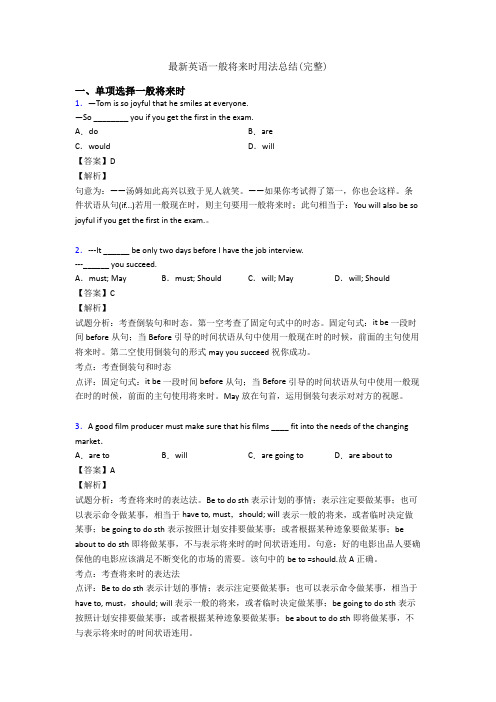
【答案】A
【解析】
试题分析:考查将来时的表达法。Be to do sth表示计划的事情;表示注定要做某事;也可以表示命令做某事,相当于have to, must,should; will表示一般的将来,或者临时决定做某事;be going to do sth表示按照计划安排要做某事;或者根据某种迹象要做某事;be about to do sth即将做某事,不与表示将来时的时间状语连用。句意:好的电影出品人要确保他的电影应该满足不断变化的市场的需要。该句中的be to =should.故A正确。
考点:考查时态
7.- Will you be available at three o'clock tomorrow afternoon?
- No. I ______ a lecture then.
A.are attendingB.will have attendedC.will attendD.will be attending
A.have beenB.am
C.wasD.will be
【答案】D
【解析】
试题分析:考查动词的时态。句意:Crawford夫人问道:“你(长大了)想干什么?”“哦,我想当总统。”男孩面带微笑地说。根据问句“What do you want to be?”可知,该句中暗含“when you grow up”,因此回答用一般将来时。
A.sawB.have seenC.will seeD.are seeing
【答案】C
【解析】
【详解】
考查固定句型中的时态。句意:关闭身后的恐惧之门,在你的面前便会开启另一扇信心之门。本句为“祈使句+and+完整的陈述句”结构,and前的祈使句相对于if引导的条件从句,and后的句子通常为一般将来时或含有情态动词。故选C。
英语一般将来时用法总结(完整)

【解析】
be doing可以用来表示将来,指按照时间安排表即将发生的事情,是有计划安排的;will do强调的是主观性,不表达按时间安排表即将发生的事情。句意:得知班里一个尖子生因为家庭原因要离开学校,班主任很焦虑。
【解析】
试题分析:考查时态。本句考查的是将来时的一种表达法be to do sth将要做某事;句意:AC米兰俱乐部确认英国球星贝克汉姆将很快就重新加盟该队。本句的关键词是soon该词经常与将来时连用。故D正确。
考点:考查将来时的表达法
点评:在英语中将来时有多种表达法。Be to do sth表示计划的事情;或者表示注定要做某事;也可以表示命令做某事,相当于have to, must,should; will表示一般的将来,或者临时决定做某事;be going to do sth表示按照计划安排要做某事;或者根据某种迹象要做某事;be about to do sth即将做某事,不与表示将来时的时间状语连用。现在进行时表示一般将来时,表示按照计划安排要发生的事情,且动词要是一些表示位置变化的动词。
A.doesn'tB.hasn'tC.hadn'tD.won't
【答案】D
【解析】
试题分析:此处doesn't表示一般现在时;hasn't现在完成时;hadn't过去完成时;won't一般将来时,意为:不愿,表意愿。句意:—我让你请求John来参加今晚是聚会?—是的,我请了,但他不愿意来。根据句意选D。
考点:考查祈使句和动词时态的用法。
18.The class teacher was anxious to hear one of his top students _____ because of family move.
英语动词时态用法归纳:一般将来时

英语动词时态用法归纳:一般将来时一、一般将来时的构成一般将来时的由s hall / will+ 动词原形构成。
二、一般将来时的基本用法(1) 表示单纯的将要发生的动作或情况。
常与表示将来的时间状语连用。
如:Tomorrow will be Sunday. 明天是星期天。
They say that it will rain. 他们说要下雨。
I’ll be thirty-seven on my next birthday. 到下次生日,我就三十七岁了。
We won’t be free tonight. 今晚我们没空。
(2) 也可以表示临时决定要做的事。
如:—I thought I asked you to sweep the floor.—O h, I’m sorry. Mother, I will do it right now.—我原以为我让你扫地了。
—噢,对不起,妈妈,我就做。
—You have left the door open.—O h, so I have. I’ll go and lock it.—你忘了锁门。
—哦,是的。
我就去。
(3) 有时虽没有时间状语,但从意思上可以判断指将来的动作。
如:Who will take the chair? 谁当主席?You will pass the examination. 你会通过那个考试的。
The meeting won’t last long. 会开不了多久。
(4) 一般将来时有时还表示倾向和习惯性。
如:Oil will float on water. 油总浮在水面上。
Fish will die without water。
鱼离开水就会死掉。
The machine won't work because of a faulty connection. 机器电源线接错了,所以开不动。
三、表示将来时的几种方法(1) be going to+动词原形。
英语一般将来时用法总结(完整)
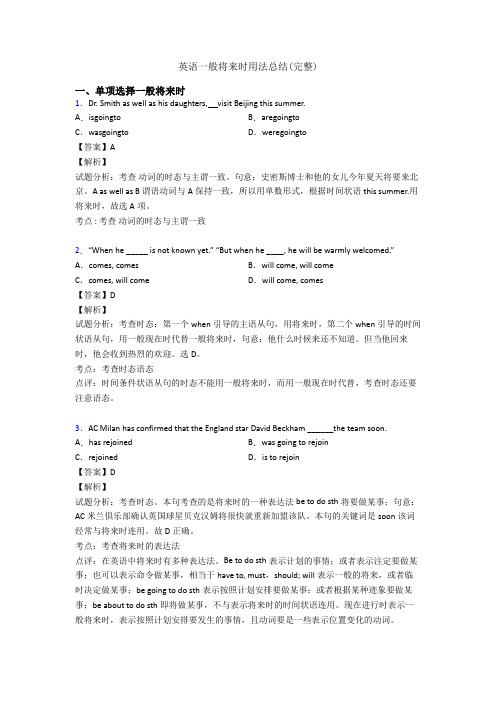
英语一般将来时用法总结(完整)一、单项选择一般将来时1.Dr. Smith as well as his daughters, visit Beijing this summer.A.isgoingto B.aregoingtoC.wasgoingto D.weregoingto【答案】A【解析】试题分析:考查动词的时态与主谓一致。
句意:史密斯博士和他的女儿今年夏天将要来北京。
A as well as B 谓语动词与A保持一致,所以用单数形式,根据时间状语this summer.用将来时,故选A项。
考点 : 考查动词的时态与主谓一致2.“When he _____ is not known yet.” “But when he ____, he will be warmly welcomed.”A.comes, comes B.will come, will comeC.comes, will come D.will come, comes【答案】D【解析】试题分析:考查时态:第一个when引导的主语从句,用将来时,第二个when引导的时间状语从句,用一般现在时代替一般将来时,句意:他什么时候来还不知道。
但当他回来时,他会收到热烈的欢迎。
选D。
考点:考查时态语态点评:时间条件状语从句的时态不能用一般将来时,而用一般现在时代替,考查时态还要注意语态。
3.AC Milan has confirmed that the England star David Beckham ______the team soon. A.has rejoined B.was going to rejoinC.rejoined D.is to rejoin【答案】D【解析】试题分析:考查时态。
本句考查的是将来时的一种表达法be to do sth将要做某事;句意:AC米兰俱乐部确认英国球星贝克汉姆将很快就重新加盟该队。
本句的关键词是soon该词经常与将来时连用。
英语一般将来时用法总结(完整)
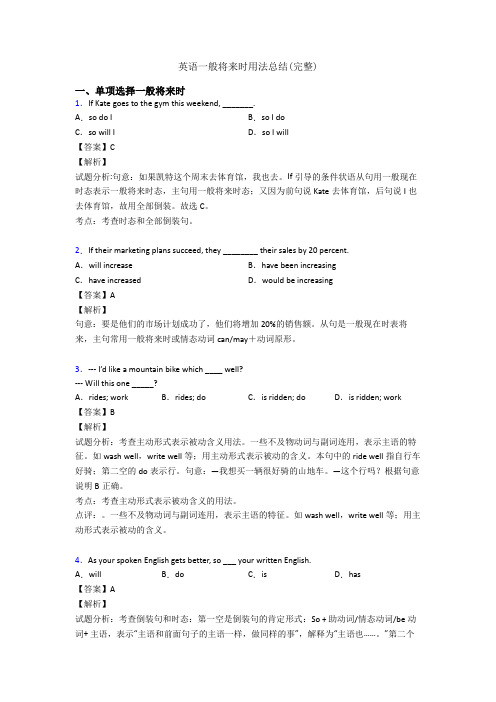
英语一般将来时用法总结(完整)一、单项选择一般将来时1.If Kate goes to the gym this weekend, _______.A.so do I B.so I doC.so will I D.so I will【答案】C【解析】试题分析:句意:如果凯特这个周末去体育馆,我也去。
If引导的条件状语从句用一般现在时态表示一般将来时态,主句用一般将来时态;又因为前句说Kate去体育馆,后句说I也去体育馆,故用全部倒装。
故选C。
考点:考查时态和全部倒装句。
2.If their marketing plans succeed, they ________ their sales by 20 percent.A.will increase B.have been increasingC.have increased D.would be increasing【答案】A【解析】句意:要是他们的市场计划成功了,他们将增加20%的销售额。
从句是一般现在时表将来,主句常用一般将来时或情态动词can/may+动词原形。
3.--- I’d like a mountain bi ke which ____ well?--- Will this one _____?A.rides; work B.rides; do C.is ridden; do D.is ridden; work【答案】B【解析】试题分析:考查主动形式表示被动含义用法。
一些不及物动词与副词连用,表示主语的特征。
如wash well,write well等;用主动形式表示被动的含义。
本句中的ride well指自行车好骑;第二空的do表示行。
句意:—我想买一辆很好骑的山地车。
—这个行吗?根据句意说明B正确。
考点:考查主动形式表示被动含义的用法。
点评:。
一些不及物动词与副词连用,表示主语的特征。
如wash well,write well等;用主动形式表示被动的含义。
- 1、下载文档前请自行甄别文档内容的完整性,平台不提供额外的编辑、内容补充、找答案等附加服务。
- 2、"仅部分预览"的文档,不可在线预览部分如存在完整性等问题,可反馈申请退款(可完整预览的文档不适用该条件!)。
- 3、如文档侵犯您的权益,请联系客服反馈,我们会尽快为您处理(人工客服工作时间:9:00-18:30)。
一般将来时用法小结编稿:贾巍审稿:郭宇责编:夏芳莲一般将来时表示在将来某个时间要发生的动作或存在的状态。
一. 一般将来时的构成:1. 由助动词“ shall/ will +动词原形”构成,shall 用于第一人称,will 用于第二、第三人称,而美式英语在陈述句中无论什么人称,一律用will 。
2. 一般将来时的否定和疑问形式:一般将来时的否定形式是will not ,缩写为won't; shall not ,缩写为shan't 。
一般将来时的疑问形式是把will/ shall 提到主语前。
如:He won’t go to the park this Sunday. 本周日他不去公园。
Will you go swimming with me? 和我一起去游泳好吗?二. 一般将来时的基本用法:表示“纯粹的将来”:①表示将要发生的动作或情况,常带有表示将来的时间状语,如tomorrow, next week, in two days, from now on 等。
如:It will be fine tomorrow. 明天天气晴朗。
②表示预料将要发生的动作或情况。
如:You will feel better after having this medicine. 吃了这药,你就会感觉好些的。
③表示由于习惯倾向而会经常发生的动作,本用法中的will 要重读。
如:Boys will be boys. [谚语]男孩毕竟是男孩。
2. 表示“带有情态意义的将来”,用来表示意图,用will 来表示。
如:I will be more careful next time. 下次我要更加小心。
I won't go shopping this afternoon, but she will. 今天下午我不想去购物,但她想去。
will 在疑问句中,用来表示有礼貌地征询对方的意见。
如:Will you have some more tea? 要不要再喝点茶?What shall we do this weekend? 本周末我们要干什么?三. 一般将来时的其它几种表示法:1. 用be going to 表示:be going to 相当于一个助动词,与其后的动词原形一起构成句子的谓语,表示近期将要发生的动作或存在的状态。
如:I'm going to see a film this afternoon. 今天下午我想去看电影。
①“ be going to +动词原形”表示主观上打算在将来某个时间要做某事。
如:Her mother is going to buy her a new bike. 她妈妈要给她买辆新自行车。
②“ be going to +动词原形”还可以表示说话人根据已有的迹象认为将要发生的事。
如:It's going to rain. 快要下雨了。
2. 用一般现在时表示将来意义句中的动词是一般现在时,但所表示的意义却是一般将来时。
如:Are you free tomorrow? =Are you going to be free tomorrow? 你明天有空吗?在时间/ 条件状语从句中,如果主句是一般将来时,从句习惯上用一般现在时表示将来的意义。
如:Please tell him to go when he comes. 他来时,就让他去。
3. 用位置移动的行为动词的现在进行时表示将来意义:这些动词有come, go, leave, begin, arrive, start 等。
如:We are leaving tomorrow 。
我们明天要走了一般将来时练习:() 1. There __________ a meeting tomorrow afternoon.A. will be going toB. will going to beC. is going to beD. will go to be() 2. Charlie ________ here next month.A. isn’t workingB. doesn’t workingC. isn’t going to workingD. won’t work() 3. He ________ very busy this week, he ________ free next week.A. will be; isB. is; isC. will be; will beD. is; will be() 4. There ________ a dolphin show in the zoo tomorrow evening.A. wasB. is going to haveC. will haveD. is going to be() 5. –________ you ________ free tomorrow?– No. I ________ free the day after tomorrow.A. Are; going to; willB. Are; going to be; willC. Are; going to; will beD. Are; going to be; will be() 6.Mother ________ me a nice present on my next birthday.A. will givesB. will giveC. givesD. give() 7. – Shall I buy a cup of tea for you?–________. (不,不要。
)A. No, you won’t.B. No, you aren’t.C. No, please don’t.D. No, please.() 8. – Where is the morning paper?– I ________ it for you if you want it at once.A. getB. am gettingC. to getD. will get() 9. ________ a concert next Saturday?A. There will beB. Will there beC. There can beD. There are() 10. If they come, we ________ a meeting.A. haveB. will haveC. hadD. would have() 11. He ________ her a beautiful hat on her next birthday.A. givesB. gaveC. will givingD. is going to give() 12. He ________ to us as soon as he gets there.A. writesB. has writtenC. will writeD. wrote() 13. He ________ in three days.A. coming backB. came backC. will come backD. is going to coming back() 14. If it ________ tomorrow, we’ll go roller-skating.A. isn’t rainB. won’t rainC. doesn’t rainD. doesn’t fine() 15. – Will his parents go to see the Terra Cotta Warriors tomorrow?– No, ________ (不去).A. they willn’t.B. they won’t.C. they aren’t.D. they don’t.1. C这个句型是there be与be going to的结合,结合后是there is going to be。
2. D A是进行时态的,B与 C 构成都有问题,doesn’t 与be going to 后面都应该放动词原型。
3. D根据时间状语this week和next week断定出前半句一般现在时,根据后半句判断应该是一般将来时。
4. D理由同第一题的一样。
5. D be free是固定搭配,所以无论是用be going to句型还是用will句型都不能少了be。
6. B.. 根据next birthday判断,这个句子应该是一般将来时的,它的构成应该是will + 动词原形。
7.C事实上这个句子不是一般将来时,是一个请求别人许可的句子。
所以回答的时候应该比较客气。
8.D at once 是一个一般将来时的时间状语,所以这个用一般将来时。
9.B从句子结尾的问号看,这个句子是问句,只有B选项是按照问句的形式给出的。
10.B这是一个典型的主将从现的句型,条件从句是现在时的,主句应该是将来时的。
11.D on her next birthday.这个时间状语说明时态上应该是一般将来时。
12.C这是一个典型的主将从现的句型,时间状语从句是现在时的,主句应该是将来时的。
13.C in three days是一个一般将来时的时间状语,意思是三天以后,所以是一般将来时的句子。
14.C这是一个典型的主将从现的句型,主句是将来时的,条件从句应该是现在时的。
15.B所问要所答。
